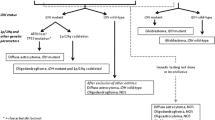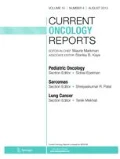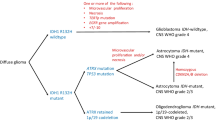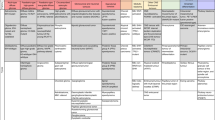Abstract
Recent molecular correlative studies accompanying clinical trials in glioma have provided strong evidence for prognostic markers and predictive factors for treatment response. However, to what extent can these markers influence the limited choice of therapeutic options? Do we further validate the markers in the next trials or move on, incorporate the markers for patient selection or stratification, aim at improving the modestly effective treatments by adding new drugs, and develop alternative therapy strategies for patients selected for their bad predictor?
Similar content being viewed by others

References and Recommended Reading
Godard S, Getz G, Delorenzi M, et al.: Classification of human astrocytic gliomas on the basis of gene expression: a correlated group of genes with angiogenic activity emerges as a strong predictor of subtypes. Cancer Res 2003, 63:6613–6625.
Misra A, Pellarin M, Nigro J, et al.: Array comparative gemomic hybridization identifies genetic subgroups in grade 4 human astrocytoma. Clin Cancer Res 2005, 11:2907–2918.
Watanabe K, Tachibana O, Sata K, et al.: Overexpression of the EGF receptor and p53 mutations are mutually exclusive in the evolution of primary and secondary glioblastomas. Brain Pathol 1996, 6:217–223; discussion 223–214.
Cairncross JG, Ueki K, Zlatescu MC, et al.: Specific genetic predictors of chemotherapeutic response and survival in patients with anaplastic oligodendrogliomas. J Natl Cancer Inst 1998, 90:1473–1479. First study reporting the association between genetic marker and outcome.
Smith JS, Perry A, Borell TJ, et al.: Alterations of chromosome arms 1p and 19q as predictors of survival in oligodendrogliomas, astrocytomas, and mixed oligoastrocytomas. J Clin Oncol 2000, 18:636–645.
Cairncross G, Seiferheld W, Shaw E, et al.: An intergroup randomized controlled clinical trial (RCT) of chemotherapy plus radiation (RT) versus RT alone for pure and mixed anaplastic oligodendrogliomas: Initial report of RTOG 94–02. J Clin Oncol, ASCO Annual Meeting Proceedings (Post-Meeting Edition) 2004, 22(14S):abstract 1500.
van den Bent MJ, Delattre J-Y, Brandes AA, et al.: First analysis of EORTC trial 26951, a randomized phase III study of adjuvant PCV chemotherapy in patients with highly anaplastic oligodendroglioma. J Clin Oncol 2005, 23(16 Suppl):114s [abstract 1503].
Burger PC: What is an oligodendroglioma? Brain Pathol 2002, 12:257–259. Points out the difficulty of objective pathology criteria for "oligodendroglioma" and describes the "changing" frequencies over the years.
Choe G, Horvath S, Cloughesy TF, et al.: Analysis of the phosphatidylinositol 3’-kinase signaling pathway in glioblastoma patients in vivo. Cancer Res 2003, 63:2742–2746.
Montgomery RB, Moscatello DK, Wong AJ, et al.: Differential modulation of mitogen-activated protein (MAP) kinase/extracellular signal-related kinase kinase and MAP kinase activities by a mutant epidermal growth factor receptor. J Biol Chem 1995, 270:30562–30566.
Guha A, Feldkamp MM, Lau N, et al.: Proliferation of human malignant astrocytomas is dependent on Ras activation. Oncogene 1997, 15:2755–2765.
Rajasekhar VK, Viale A, Socci ND, et al.: Oncogenic Ras and Akt signaling contribute to glioblastoma formation by differential recruitment of existing mRNAs to polysomes. Mol Cell 2003, 12:889–901.
Moscatello DK, Holgado-Madruga M, Emlet DR, et al.: Constitutive activation of phosphatidylinositol 3-kinase by a naturally occurring mutant epidermal growth factor receptor. J Biol Chem 1998, 273:200–206.
Rich JN, Reardon DA, Peery T, et al.: Phase II trial of gefitinib in recurrent glioblastoma. J Clin Oncol 2004, 22:133–142.
Haas-Kogan DA, Prados MD, Tihan T, et al.: Epidermal growth factor receptor, protein kinase B/Akt, and glioma response to erlotinib. J Natl Cancer Inst 2005, 97:880–887.
Cappuzzo F: Erlotinib in gliomas: should selection be based on EGFR and Akt analyses? J Natl Cancer Inst 2005, 97:868–869.
Lynch TJ, Bell DW, Sordella R, et al.: Activating mutations in the epidermal growth factor receptor underlying responsiveness of non-small-cell lung cancer to gefitinib. N Engl J Med 2004, 350:2129–2139.
Paez JG, Janne PA, Lee JC, et al.: EGFR mutations in lung cancer: correlation with clinical response to gefitinib therapy. Science 2004, 304:1497–1500.
Frederick L, Wang XY, Eley G, James CD: Diversity and frequency of epidermal growth factor receptor mutations in human glioblastomas. Cancer Res 2000, 60:1383–1387.
Barber TD, Vogelstein B, Kinzler KW, Velculescu VE: Somatic mutations of EGFR in colorectal cancers and glioblastomas. N Engl J Med 2004, 351:2883.
Tsao MS, Sakurada A, Cutz JC, et al.: Erlotinib in lung cancer—molecular and clinical predictors of outcome. N Engl J Med 2005, 353:133–144.
Lachat Y, Diserens AC, Nozaki M, et al.: INK4a/Arf is required for suppression of EGFR/DeltaEGFR(2-7)-dependent ERK activation in mouse astrocytes and glioma. Oncogene 2004, 23:6854–6863.
Goudar RK, Shi Q, Hjelmeland MD, et al.: Combination therapy of inhibitors of epidermal growth factor receptor/vascular endothelial growth factor receptor 2 (AEE788) and the mammalian target of rapamycin (RAD001) offers improved glioblastoma tumor growth inhibition. Mol Cancer Ther 2005, 4:101–112.
Beuvink I, Boulay A, Fumagalli S, et al.: The mTOR inhibitor RAD001 sensitizes tumor cells to DNA-damaged induced apoptosis through inhibition of p21 translation. Cell 2005, 120:747–759.
Esteller M, Garcia-Foncillas J, Andion E, et al.: Inactivation of the DNA-repair gene MGMT and the clinical response of gliomas to alkylating agents. N Engl J Med 2000, 343:1350–1354. This report showed the first association of the methylation status of the MGMT gene promoter for outcome prediction in a series of malignant glioma treated with alkylating agents.
Hegi ME, Diserens A-C, Godard S, et al.: Clinical trial substantiates the predictive value of MGMT-methylation in glioblastoma patients treated with temozolomide. Clin Cancer Res 2004, 10:1871–1874.
Stupp R, Dietrich P-Y, Ostermann Kraljevic S, et al.: Promising survival for patients with newly diagnosed glioblastoma multiforme treated with concomitant radiation plus temozolomide followed by adjuvant temozolomide. J Clin Oncol 2002, 20:1375–1382.
Hotta T, Saito Y, Fujita H, et al.: O6-alkylguanine-DNA alkyltransferase activity of human malignant glioma and its clinical implications. J Neurooncol 1994, 21:135–140.
Belanich M, Pastor M, Randall T, et al.: Retrospective study of the correlation between the DNA repair protein alkyltransferase and survival of brain tumor patients treated with carmustine. Cancer Res 1996, 56:783–788.
Jaeckle KA, Eyre HJ, Townsend JJ, et al.: Correlation of tumor O6 methylguanine-DNA methyltransferase levels with survival of malignant astrocytoma patients treated with bis-chloroethylnitrosourea: a Southwest Oncology Group study. J Clin Oncol 1998, 16:3310–3315.
Friedman HS, McLendon RE, Kerby T, et al.: DNA mismatch repair and O6-alkylguanine-DNA alkyltransferase analysis and response to Temodal in newly diagnosed malignant glioma. J Clin Oncol 1998, 16:3851–3857.
Silber JR, Blank A, Bobola MS, et al.: O6-methylguanine-DNA methyltransferase-deficient phenotype in human gliomas: frequency and time to tumor progression after alkylating agent-based chemotherapy. Clin Cancer Res 1999, 5:807–814.
Gerson SL: MGMT: its role in cancer aetiology and cancer therapeutics. Nat Rev Cancer 2004, 4:296–307. Review on the MGMT repair mechanism and its relevance for cancer treatment.
Stupp R, Mason WP, van den Bent MJ, et al.: Radiotherapy plus concomitant and adjuvant temozolomide for glioblastoma. N Engl J Med 2005, 352:987–996. First randomized phase III clinical trial for newly diagnosed glioblastoma showing that the addition of chemotherapy (TMZ) to standard radiotherapy provides a survival benefit.
Hegi ME, Diserens AC, Gorlia T, et al.: MGMT gene silencing and benefit from temozolomide in glioblastoma. N Engl J Med 2005, 352:997–1003. First demonstration in a randomized phase III trial that the methylation status of the MGMT gene promoter predicts benefit from chemotherapy treatment (TMZ) in newly diagnosed glioblastoma.
De Angelis LM: Chemotherapy for brain tumors: a new beginning. N Engl J Med 2005, 352:1036–1038.
Wasserfallen JB, Ostermann S, Pica A, et al.: Can we afford to add chemotherapy to radiotherapy for glioblastoma multiforme? Cost-identification analysis of concomitant and adjuvant treatment with temozolomide until patient death. Cancer 2004, 101:2098–2105.
Mollemann M, Wolter M, Felsberg J, et al.: Frequent promoter hypermethylation and low expression of the MGMT gene in oligodendroglial tumors. Int J Cancer 2005, 113:379–385.
Author information
Authors and Affiliations
Corresponding author
Rights and permissions
About this article
Cite this article
Hegi, M.E., Stupp, R. Correlative studies in neuro-oncology trials: Should they influence treatment?. Curr Oncol Rep 8, 54–57 (2006). https://doi.org/10.1007/s11912-006-0010-z
Issue Date:
DOI: https://doi.org/10.1007/s11912-006-0010-z



